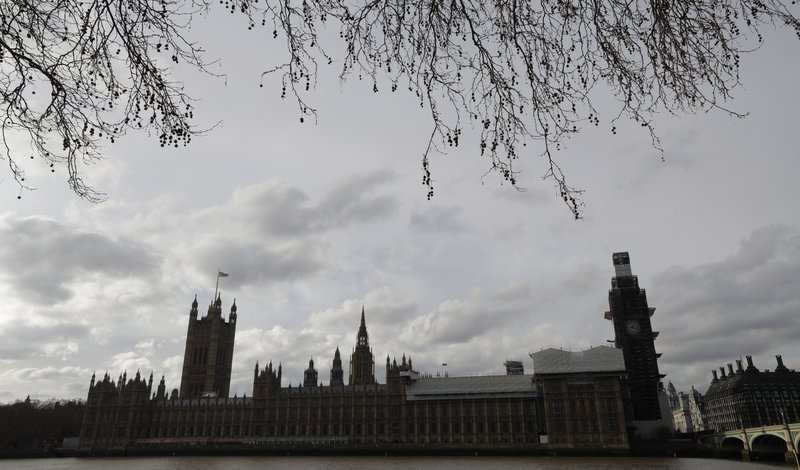LONDON -- As Prime Minister Theresa May prepared her next move in Britain's deadlocked battle over leaving the European Union, a senior opposition politician said Sunday that it's unlikely the U.K. will exit the bloc as scheduled on March 29.
A government minister, however, warned that failure to deliver on the planned departure would betray voters and unleash a "political tsunami."
May is due to present Parliament with a revised EU-exit plan today, after the divorce deal she had struck with the EU was rejected by lawmakers last week. With just over two months until Britain is due to leave the bloc, some members of Parliament are pushing for the U.K. to delay its departure until the country's divided politicians can agree on a way forward.
Keir Starmer, spokesman for the opposition Labor Party, said "it's inevitable" that Britain will have to ask the EU to extend the two-year exit countdown that ends March 29.
"The 29th of March is 68 days away," Starmer told the BBC. "We are absolutely not prepared for it. It would be catastrophic."
Some EU governments have voiced disagreement over how long they think the U.K. should delay its departure, with some pushing for an extension of as much as a year, diplomats said.
While some countries think the EU should offer Britain a generous period to negotiate a deal that will win the backing of Parliament, possibly after a second referendum, others oppose a postponement of any sort and want pressure to be put on the U.K. to accept a deal as soon as possible, according to four EU diplomats.
Britain's political impasse is fueling concerns that the country may crash out of the EU on March 29 with no agreement in place to cushion the shock. That could lead to tariffs imposed on goods moving between Britain and the EU, sparking logjams at ports and shortages of essential supplies. Many economists expect Britain to plunge into recession if there is a "no-deal" departure.
May's government is split between ministers who think a disorderly departure must be avoided at all costs, and exit-backers who believe it would be preferable to delaying or reversing the divorce.
Dominic Raab, who served as secretary for the EU exit but quit the government in opposition to May's agreement with the bloc, said a no-deal departure would have "short-term risks" but that they would be "manageable."
International Trade Secretary Liam Fox wrote in the Sunday Telegraph that "failure to deliver Brexit would produce a yawning gap between Parliament and the people, a schism in our political system with unknowable consequences."
He said public anger could trigger "a political tsunami."
In the days since her deal was rejected, May has met with government and opposition lawmakers in an attempt to find a compromise. But the talks have produced few signs that May plans to make radical changes to her deal or lift her insistence that any departure means leaving the EU's single market and customs union.
Fox said one possible solution could be to strike a deal with the Irish government guaranteeing there would be no border controls between EU member Ireland and the U.K.'s Northern Ireland.
He said that could ease concerns about the deal's most contentious measure -- an insurance policy known as the "backstop" that would keep Britain in an EU customs union to maintain an open Irish border. Pro-exit lawmakers worry that Britain could be trapped indefinitely in the arrangement, bound to EU trade rules and unable to strike new deals around the world.
Irish Foreign Minister Simon Coveney, however, tweeted that the Irish government was committed to the entire withdrawal deal, "including the backstop."
British lawmakers who want a softer exit are preparing to try to amend May's plans in a Jan. 29 debate, and to use parliamentary rules to try to prevent a no-deal withdrawal and to take control of the exit process.
Nicky Morgan, a lawmaker in May's Conservative Party, said she and several opposition colleagues planned to introduce a bill to ensure "that if the prime minister can't get an agreement approved by the House of Commons by the end of February," the U.K. will ask the EU to postpone its departure date "so that we can build a consensus and get ourselves more prepared for Brexit."
Delaying the exit would require approval from the 27 other EU nations.
Starmer said there was a roadblock in the way of a solution to the crisis over the withdrawal, "and that roadblock is the prime minister."
"Her mind is closed," he said.
German Chancellor Angela Merkel -- who is taking a more flexible approach on the timing of any extension -- indicated Saturday that she wants to help Britain secure an orderly exit. She said it's the EU's responsibility to help find a solution.
"We also have a responsibility to shape this separation process in a responsible way, so that people don't look back in 50 years, shaking their heads, and say why weren't we in a position to make a compromise?" she said.
France and the European Commission, the EU's executive arm, are among those pushing for a long extension, said diplomats, who spoke on condition of anonymity because the discussions are private.
Several governments think the fast-approaching deadline acts as leverage and that the U.K. shouldn't be offered any delay, or only a "technical" one of a matter of weeks, to allow the U.K. Parliament to pass necessary legislation.
Some officials in European capitals believe there is still a chance that Britain could change its mind and stay in the bloc. The believe that the longer the EU can prolong the negotiation period, the more likely that will become. Others think a line needs to be drawn so European governments can focus on other matters, such as fighting populism and strengthening the euro area.
Information for this article was contributed by Jill Lawless by Ian Wishart of Bloomberg News.
A Section on 01/21/2019
